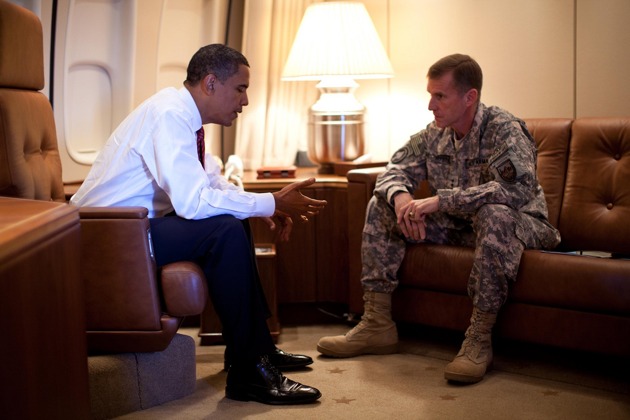The initial reaction to Michael Hastings’s Rolling Stone article on General McChrystal was disturbing. The emphasis has been on the early parts of the article, with McChrystal’s dismissive attitude toward the President and his administration. Instant discussion focused on the person McChrystal—should he be fired, or resign, or have his resignation accepted? That does not matter. The Hastings article is powerful and important because of what it goes on to report from Afghanistan, building to a crushing conclusion, that the general was unable to command even the respect of Hamid Karzai and McChrystal’s own troops—for the very good reason that he has been given an impossible assignment, one that gets more surreal and absurd every day. His removal will not make the Afghan war go any better, for the simple reason that nothing will do that.
The parallel with Truman’s firing General MacArthur was quickly bruited—and that was surely more needed, since the general in that war was calling for and threatening nuclear strikes. But firing MacArthur did not improve things in Korea. The war ground on in blood and frustration for another two grisly years, and was settled only when a new administration settled for peace terms that would have been available years earlier. Do we have to wait for a new administration to make a similarly sullen settlement in Afghanistan after further prolongation of what is already America’s longest war?
The conflict around McChrystal will only matter if it is the occasion of recognizing what a fool’s errand he was sent on. Any military replacement will only repeat his calls for more time, more troops, more recognition of the failed policy of “counter-insurgency” (COIN). Hastings’s real point is signaled early in his Rolling Stone piece:
The president finds himself stuck in something even more insane than a quagmire: a quagmire he knowingly walked into, even though it’s precisely the kind of gigantic, mind-numbing, multigenerational nation-building project he explicitly said he didn’t want.
McChrystal went to his station at a time when our few allies are leaving, national support at home is evaporating, Karzai is looking to future deals, and the strains of overcommitment in numbers and undercommitment in real resources is tearing our forces apart. The New York Times reports that we are now paying tribal chiefs to protect our contractors, whom we are paying to protect troops, who are no longer able to fend for themselves in an impossible assignment. We keep paying for results that do not occur.
Joe Klein of Time magazine wrote this rather swoony praise of McChrystal:
Here is the Stanley McChrystal I know: A few months ago, he received an email from a soldier fighting in Kandahar Province. The soldier was frustrated—as most of his comrades are—with the very restrictive rules of engagement that the General had laid down to prevent civilian casualties. Rather than ignore the email or have the trooper reprimanded, McChrystal went to Kandahar and walked a patrol with the soldier’s squad. Afterwards, he had meal with the squad and explained the necessity for the new rules. This is an extraordinary man, with the perfect skill set necessary for the mission in Afghanistan… Stanley McChrystal is precisely the sort of man who should be leading American troops in battle.
Hastings tells that same story in Rolling Stone. But he stayed around for its sequel. The same squad lost a man who had walked with McChrystal on that patrol, and it emailed for him to join them again, this time for their comrade’s memorial. McChrystal went, and was met with a storm of protest. One after another the squad members said that counter-insurgency was not working. “Sir, some of the guys here, sir, think we’re losing,” says one. Again McChrystal tries to explain the plan. McChrystal had claimed his forces were slowing the momentum of the insurgency. The protests went on. “I don’t believe that’s true in this area. The more we pull back, the more we restrain ourselves, the stronger it’s getting.” McChrystal “seems to sense that he hasn’t succeeded at easing the men’s anger…. The session ends with no clapping and no resolution.”
No other general is going to succeed with such men in such a position. The overwhelming lesson of Hastings’s article is not: “Get rid of McChrystal.” It is, simply: “Get out!”


